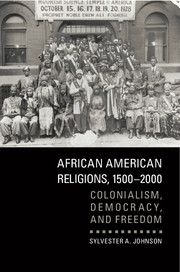Book contents
- Frontmatter
- Contents
- List of Figures
- Acknowledgments
- Introduction
- PART ONE
- PART TWO
- PART THREE
- 6 Garveyism, Anticolonialism, and State Repression of Black Religions
- 7 Fundamentalism, Counterintelligence, and the “Negro Rebellion”
- 8 Black Religion, the Security State, and the Racialization of Islam
- Conclusion: Black Religion, Freedom, and Colonialism
- Selected Bibliography
- Index
8 - Black Religion, the Security State, and the Racialization of Islam
from PART THREE
Published online by Cambridge University Press: 05 August 2015
- Frontmatter
- Contents
- List of Figures
- Acknowledgments
- Introduction
- PART ONE
- PART TWO
- PART THREE
- 6 Garveyism, Anticolonialism, and State Repression of Black Religions
- 7 Fundamentalism, Counterintelligence, and the “Negro Rebellion”
- 8 Black Religion, the Security State, and the Racialization of Islam
- Conclusion: Black Religion, Freedom, and Colonialism
- Selected Bibliography
- Index
Summary
As African American organizations like the Student Non-violent Coordinating Committee (SNCC), the Third World Women's Alliance, the Council on African Affairs, and the Congress of Racial Equality (CORE) continually emphasized, the plight of racist governance in the United States was already linked to US practices of colonialism. In tandem, they emphasized that the long arc of anticolonialism among African Americans was just one subset of a global struggle to create self-determination among the victims of Western colonialism. The rising scale of US imperialism, in this context, played an increasingly central role. By the end of the Second World War, with the emergence of the United Nations, the United States turned its attention more fully to expanding both its global reach and control of foreign territories through private corporate hegemony in Latin America, Asia, and Africa through open brutal military might as well as through CIA operatives to overthrow democratic and nondemocratic governments around the globe – in other words, by any means necessary. Why did the United States pursue this foreign policy approach?
African American Islam, Federal Repression, and US Empire
Between the years 1945 and 1960, no fewer than forty nations – comprising mostly non-White peoples colonized by European nations – rebelled against their conquerors and demanded their freedom, typically through violent, military action. These forty nations represented approximately 800 million human beings. Included in this number were the polities that would become Ghana, Kenya, Lesotho, Iraq, Iran, the Democratic Republic of Congo, Kenya, and India. During the World War II years, the US economy had grown voraciously because of the rapid expansions of industries and consumerism based preeminently on cheap access to the natural resources located almost overwhelmingly in the regions colonized by Europe and the United States: petroleum, diamonds, rubber, uranium, copper, iron, tin, and aluminum. The nations that were fighting for independence from European colonialism had suddenly become exponentially more valuable in the eyes of the US government because of their natural resources.
- Type
- Chapter
- Information
- African American Religions, 1500–2000Colonialism, Democracy, and Freedom, pp. 377 - 400Publisher: Cambridge University PressPrint publication year: 2015



